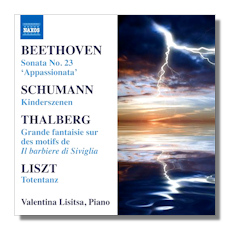
The Internet's Premier Classical Music Source
Related Links
-
Beethoven Reviews
Liszt Reviews
Schumann Reviews
Thalberg Reviews - Latest Reviews
- More Reviews
-
By Composer
-
Collections
DVD & Blu-ray
Books
Concert Reviews
Articles/Interviews
Software
Audio
Search Amazon
Recommended Links
Site News
 CD Review
CD Review
Piano Recital

- Ludwig van Beethoven:
- Piano Sonata #23 "Appassionata" in F minor, Op. 57
- Robert Schumann:
- Kinderszenen, Op. 15
- Sigismond Thalberg:
- Fantaisie sur des motifs de Il barbiere di Siviglia, Op. 63
- Franz Liszt:
- Totentanz, S525/R188
Valentina Lisitsa, piano
Naxos 8.572491 67m
Lisitsa's Beethoven Appassionata Sonata is simply superb! I was surprised because I had previously associated her with Russian repertory and Chopin, but it turns out that Beethoven is one of Lisitsa's favorite composers. She should record more of the sonatas and if she did an entire cycle of them, I would surmise that it might well rank among the very best. Lisitsa's Appassionata is fiery, powerful, full of energy and passion, tension-filled and driven. Her tempos are fast but always convincing, her articulation is crisp and clear, and her balancing of the main line with secondary or contrapuntal elements is always tastefully rendered. This is quite simply one of the finest performances of the Appassionata I've ever heard. Brendel, Schnabel, Cliburn, Ashkenazy, Barenboim and countless others have given us fine versions of this warhorse, but I can't say any of them are better. Lisitsa's is not an interpretation for the faint-hearted, however, but a white-heat account that might just leave you breathless and astonished.
To turn effectively from this work to Schumann's Kinderszenen is to turn gracefully on a dime. Lisitsa does so, more or less. Yet, while there are effective moments of repose, this is not a gentle rendition but a playful and quite spirited one for the most part. Even Träumerei sounds a little hearty in its airy and dreamy demeanor. Overall, this is a fine though somewhat muscular account of this collection of pieces. Some might prefer Brendel or Argerich, but Lisitsa is quite convincing in her own more assertive way here.
Lisitsa plays the Thalberg Grande fantasie largely as a showpiece, which it is. The work features a number of attractive Rossini themes in rather Lisztian piano dressing. It's all quite charming and dazzling, especially in this performance by Lisitsa, who misses none of the work's color. I'll bet the great Thalberg didn't play it with as much subtlety and technical skill. This is tasteful virtuosity of the first order.
As many listeners may be aware, virtuosity is also needed for the solo version of Totentanz ("Dance of Death"). But, keep in mind, Liszt also imparted considerable depth to this dark and fascinating work, a series of variations on the Dies Irae theme, the medieval melody used in the Roman Catholic Requiem Mass which would appear in countless Rachmaninov works in the 20th century. Because this short somber tune was associated with death, it also came to signify dark, even sinister elements. I doubt Liszt saw anything actually diabolical in Totentanz, but the music often seems to take on a decidedly fiendish character: to cite just one example, try the passage just before the ending when the Dies Irae theme is vehemently hammered out in the bass against threatening swirls in the right hand. While there have been excellent versions of Totentanz by Leslie Howard and Arnaldo Cohen, this Lisitsa version clearly tops them in its sheer power, its grasp of Liszt's demonic side (did I say demonic?) and its thrill-a-minute virtuosity. It would certainly be interesting to hear Lisitsa in the original (and more popular) version of Totentanz, for piano and orchestra. That would surely be a performance to acquire.
Naxos has provided excellent sound in all works and Keith Anderson's notes are, as usual, quite informative. Highly recommended.
Copyright © 2013, Robert Cummings




















